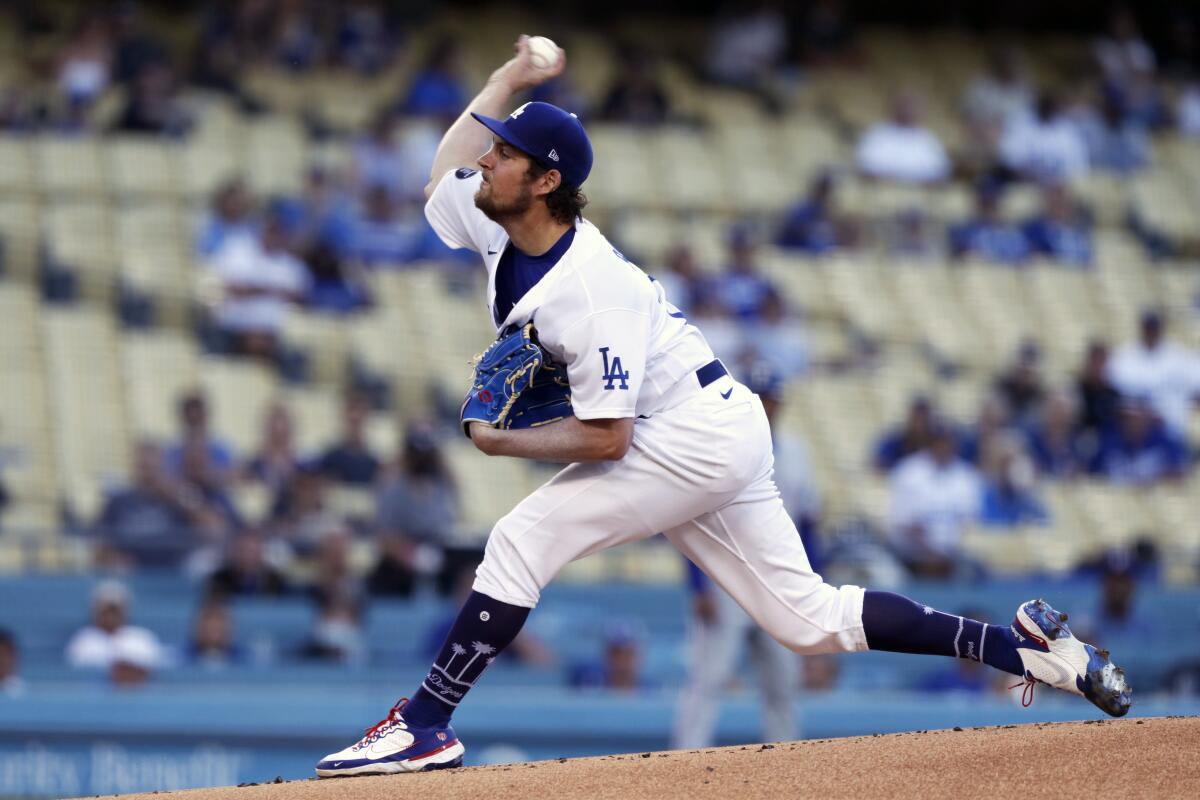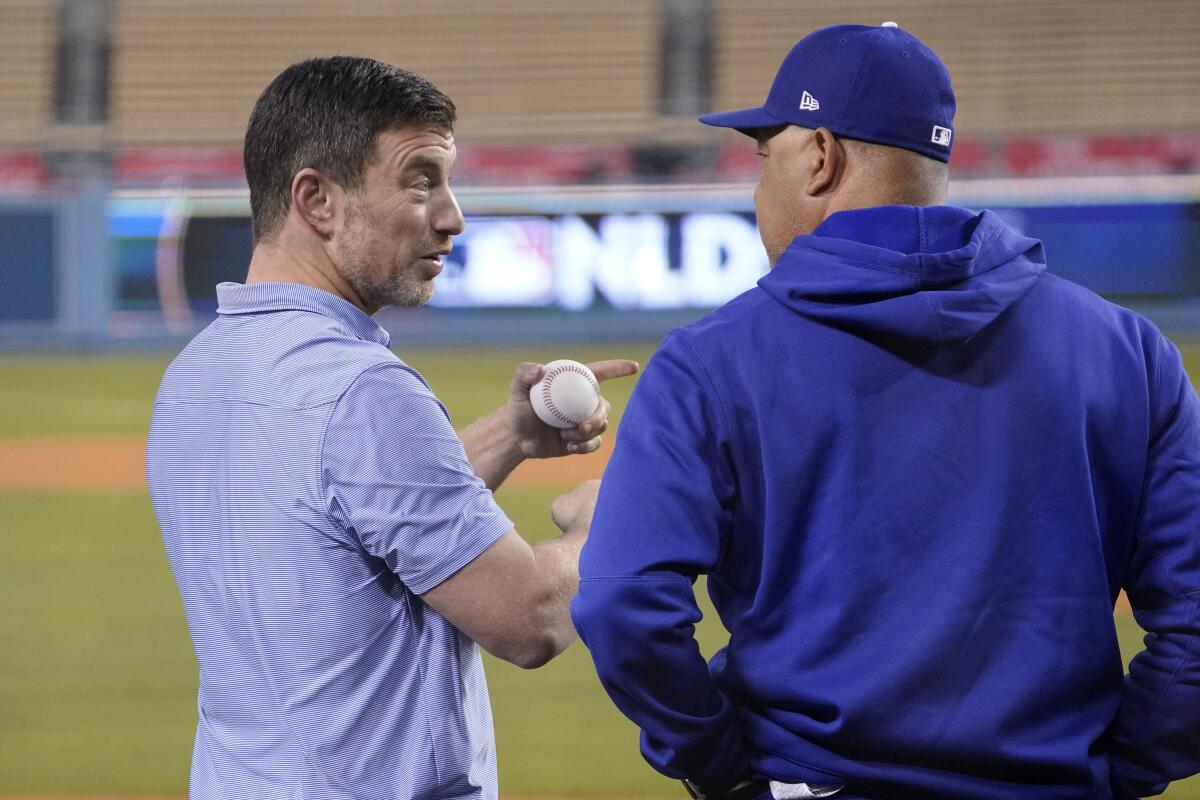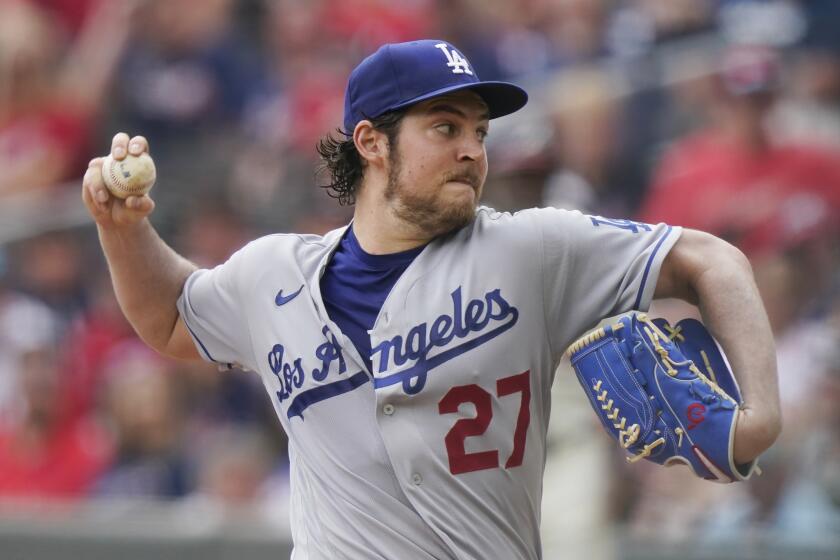Column: Dodgers lost big on their Trevor Bauer bet. Will their number crunchers save them?

The Dodgers bet on Trevor Bauer once, and they lost. They weren’t about to double down on the dumbest wager they’ve ever placed.
Starting the process to end their affiliation with Bauer won’t absolve them of their original mistake, however. Whether they release or trade him in the coming days, they will continue paying for the decision to sign him in the first place.
They have already spent the majority of this offseason on the sidelines while their rivals picked up high-priced reinforcements on the free-agent market.
Because of Bauer.
They could be limited in the salary commitments they can take on in-season.
Because of Bauer.
And they still might not be able to keep their payroll under the luxury-tax threshold.
Because of Bauer.
The Dodgers were right to release Trevor Bauer after his 194-game suspension for violating MLB’s policy on domestic violence and sexual assault.
Now, the onus will be on Andrew Friedman and his army of number crunchers to live up to their carefully curated public image. They will actually have to be smarter than their competition.
The Dodgers have qualified for the playoffs in 10 consecutive seasons, winning their division nine times in that stretch. They have won with scouting and coaching, unearthing previously overlooked gems such as Max Muncy and Tyler Anderson and training them up to be All-Stars. They have won with player development, their success stories including the likes of Corey Seager, Walker Buehler and Will Smith.
What’s made their methods work as well as they have is their wherewithal. Their war chest has permitted Friedman to outspend his mistakes.

Brandon McCarthy and Scott Kazmir were both $48-million busts in the early years of the Friedman regime. But rather than receive criticism for wasting money on a couple of broken-down pitchers, Friedman was praised for finding reasonably priced replacements in the likes of Brett Anderson and Alex Wood.
Anderson was a $10-million flier. Wood was acquired in a trade for Cuban prospect Hector Olivera, whom Friedman signed for $62.5 million.
Genius would’ve been striking deals for Anderson and Wood without signing McCarthy and Kazmir. In the context in which they were acquired, Anderson and Wood were premium insurance policies — ones other teams couldn’t afford.
The Dodgers have continued throwing around their financial weight. They spent $1 million last year on Cole Hamels, who came out of retirement only to be shut down after pitching one inning of a simulated game. They also extended Blake Treinen’s contract by a season in exchange for the reliever delaying a shoulder operation. The Dodgers hoped Treinen could recover without surgery and return for the playoffs. That didn’t happen. They’re now stuck paying his salary in a season that will be largely spent rehabilitating.

This isn’t a knock on the Dodgers. They had a financial edge and used it.
Except now, they don’t have that advantage. While they haven’t explicitly said they want to remain under the luxury-tax threshold, they certainly have behaved as if that’s the case.
With Bauer’s suspension for violating baseball’s domestic violence policy reduced from 324 games to 194, the Dodgers now owe the scandal-ridden right-hander $22.5 million, which places them near the luxury-tax threshold of $233 million.
They have little room, if any, to maneuver financially. Their roster is worse on paper than it was last year, their offseason departures including Trea Turner and Tyler Anderson. And after a decade in which they outspent the other teams in the National League West by several orders of magnitude, they have a division rival in the San Diego Padres that has a higher payroll than them.
Trevor Bauer is a free agent now that the Dodgers have cut ties with him. One former major leaguer thinks Bauer will pitch for someone this season.
This means they can’t miss on their reclamation projects such as designated hitter J.D. Martinez and starting pitcher Noah Syndergaard.
This means they have to succeed in transforming Gavin Lux into an everyday shortstop and Trayce Thompson into a reliable contributor in the outfield.
This means they have to develop their next wave of prospects, a group headlined by pitchers Ryan Pepiot and Bobby Miller.
Bauer will soon be out of sight and out of mind but will influence the Dodgers in their upcoming season as much as any player on the roster. He has cost them their greatest advantage. He has cost them their margin for error.
Complete coverage from the Los Angeles Times on the Dodgers’ decision to cut ties with embattled pitcher Trevor Bauer.
The Dodgers are now betting they can be what they say they’re about — insightful scouting and expert coaching, dependable player development and seamless integration of young talent.
Of course, if they find themselves in danger, if the Padres finally mount a real challenge to their supremacy in the division, they can resort to their old methods. They can pull out their credit cards at the trade deadline and spend, spend, spend.
There would be a downside. The Dodgers would enter next offseason as a three-time repeat luxury-tax offender and the penalties for exceeding the threshold would once again escalate. The Curse of Trevor Bauer would continue to afflict them in their anticipated pursuit of Shohei Ohtani.
More to Read
Are you a true-blue fan?
Get our Dodgers Dugout newsletter for insights, news and much more.
You may occasionally receive promotional content from the Los Angeles Times.











